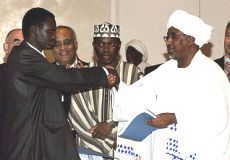Sudan govt, SLA, defend peace deal despite violence
July 16, 2006 (KHARTOUM) — The Sudanese government and a Darfur rebel faction on Sunday defended a peace deal against charges of missed deadlines and new violence, saying it had the support of the people and had produced significant results.
 Mohamed Yusuf Abdallah, deputy head of the government delegation to the Abuja peace talks, said the release of prisoners captured in fighting, as well as an amnesty, were major achievements in implementing the May 5 agreement signed in the Nigerian capital.
Mohamed Yusuf Abdallah, deputy head of the government delegation to the Abuja peace talks, said the release of prisoners captured in fighting, as well as an amnesty, were major achievements in implementing the May 5 agreement signed in the Nigerian capital.
“I think the delay that we are talking about in some aspects is right, but the things that we could implement quickly we have,” Abdallah said.
Only one of three Darfur rebel factions signed the deal — the faction of the Sudan Liberation Army (SLA) led by Minni Arcua Minnawi. Abdallah said the appointment of Minnawi to the post of first assistant to the president was a step forward.
An SLA representative said the deal had received widespread support.
“We had a great response from the people … The people understand the importance of the agreement,” SLA spokesman Abdul Kareem al Sheikh said.
But since the African Union-mediated peace deal tens of thousands of people have staged sometimes violent demonstrations against the pact, saying it does not meet their basic demands.
One of the deal’s key brokers, U.N. envoy to Sudan Jan Pronk, has said violence has worsened since the agreement. Intra-rebel fighting has increased and tribal tensions have escalated, fuelling new attacks in Sudan’s Darfur province.
The SLA-government news conference came two days before the European Union was scheduled to meet Sudanese officials in Brussels to discuss the status of the Darfur peace agreement and the transfer of the AU peacekeeping mission to U.N. troops.
Non-Arab rebels took up arms against the Arab-dominated government in 2003, accusing it of neglect and monopolising power.
Khartoum responded by arming mostly Arab militias, known as Janjaweed, who stand accused of a widespread campaign of looting and killing in non-Arab villages. Tens of thousands have died in the violence and 2.5 million people were forced into camps.
Responding to criticism that Khartoum had delayed implementation of the deal, including writing a crucial proposal on disarming the Janjaweed, a government representative said Khartoum had handed over a plan to the African Union.
He also blamed the AU, which has 7,000 peacekeepers on the ground in Darfur, for delays in implementation.
“We gave the plan to the AU and we have in fact started implementation,” said Omar Adam Rahama, a member of the government’s negotiation team in the Abuja peace deal.
“The AU forced us, kept us hostage to getting more signatories (to the peace deal). Now that everybody’s convinced that those who did not sign are not going to sign … we are set to implement the deal,” he added.
Adding to the violence in Darfur, an SLA representative at the conference accused gunmen from neighbouring Chad of attacking the group two days ago. Chadian representatives could not immediately be reached for comment.
Khartoum has in the past accused Chadian President Idriss Deby of supporting Sudanese anti-government insurgents in Darfur. Deby has in turn accused Sudan of backing and arming Chadian rebels, who are fighting to oust him.
(Reuters)
